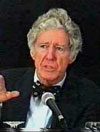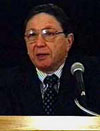Grist succumbs to millennial fever with this rendition of the classic what’s-gonna-be-hot-in-the-new-year roundup. At a recent D.C. chat session organized by Environmental Media Services, enviro leaders shared their thoughts on where the movement is headed in the coming century, what big, scary issues are lurking on the horizon, and what we need to do to slay those dragons. Here’s the Cliffs Notes version.
Lester Brown, president of the Worldwatch Institute

As the human population reached 6 billion on Oct. 12, we could see evidence of water scarcity emerging on every continent. Rivers running dry, no longer making it to the sea, water tables falling. As globalization proceeds, water scarcity will cross international boundaries through international grain trade. Falling water tables in China could mean rising food prices for the world. We need to begin thinking in a systematic way about how to raise the water productivity of the global economy, in much the same way that in the ’70s, when the price of oil tripled, we began thinking about energy efficiency or energy productivity. The key to increased water efficiency is the same key to increased energy efficiency — getting the market to tell the truth about the value or the cost of various resources. Water is grossly underpriced now in most of the world.
Bill McKibben, former New Yorker writer and author of The End of Nature and Maybe One

Climate change is the one issue which — if we don’t take care of it — might cause the whole game to be up. In the last decade, human beings crossed a certain threshold in our relationship to the natural world. For the first time in human history, we became big enough as a species to affect everything around us. The story of the next decade is increasingly going to be the story of the effects of crossing that threshold. The other story in the next decade is going to be what the political response to those effects and changes are. And the pressure on corporations will be at least as intense as the pressure on politicians.
Jane Lubchenco, professor of marine biology at Oregon State University and Pew Scholar in Conservation and the Environment

Ecosystem dysfunction presents one of the nation’s and the world’s most serious environmental challenges. Ecosystems provide us with multiple benefits ranging from purification of water and air, to regulation of climate, to the provision of pollinators, to the generation of fertile soil, to the control of pests and pathogens. We are disrupting the functioning of these systems upon which we depend, and scientists are only beginning to understand how these massive, unprecedented changes are playing out. We desperately need good, credible sources of information about what’s happening, how things are changing, what the likely consequences of different choices might be. We’ve seen junk science, ignorance, disinformation play out, and it’s a very serious threat to being able to deal with problems in a rational fashion. Second, we desperately need more comprehensive research on the causes and consequences of ecosystem dysfunction and what it means to people and how we can modify many of the changes that have already been set in motion.
Denis Hayes, chair of Earth Day Network and president of the Bullitt Foundation

The biggest threats and the biggest opportunities today probably lie in the international arena — global warming, population growth, the epidemic of extinction, weapons of mass destruction. We need to figure out a way to forge a global majority around environmental values. The international environmental movement cannot be an exclusionary movement. Earth Day 2000 is pioneering a new model of international engagement. We are creating Internet links among disparate groups around the world, uniting around a common theme, global warming, and the need for a clean energy revolution. But the first task of American environmentalists interested in global affairs is to produce a vastly better record on those issues here in the United States.
John Passacantando, president of Ozone Action

The greatest challenge is finding a way to rein in the power of corporations operating around the globe avoiding labor, health, safety, and environmental laws. These corporations are keeping our politicians from solving problems like global warming. We will have to rein these corporations in much the way the founders of this country had to throw off the shackles of the British Empire in the 1700s.
Arlie Schardt, president of Environmental Media Services

Campaign finance reform is the number one problem that the environmental movement in the United States is facing. That, of course, has an effect on what role the American environmental movement can play in helping to achieve environmental gains around the world. Without campaign finance reform, we are going to see the power of very highly, lavishly financed special interests continue to dictate what Congress does. As long as that happens, there’s no way that the environmental movement can hope to do much better than run in place, fight a defensive battle, tread water. We see examples of this in the energy crisis, where the combined resources of the automobile, highway, transportation, and oil lobbies can stave off any gains whatsoever on crucial problems. Until the environmental movement makes campaign finance reform as high a priority as water resources or clean air or safe food, we are not going to see the necessary progress to resolve these problems.
John Adams, president of the Natural Resources Defense Council

The issue of the day is climate change. We see hurricanes, we see 30 days in a row of over 100 degrees of heat in Texas, we see floods and mudslides and fires — all of which are predicted to be part of the global warming theory by the world’s leading scientists. We have to do something about this. We have to get cars that are fuel-efficient and clean, and get rid of sport utility vehicles that don’t deliver good gas mileage. We need to get rid of polluting power plants; the power plants that are exempted from the Clean Air Act are the first ones to tackle. We need to get natural gas as a source of fuel in the short-term. Finally, we need to move very quickly with major investments in clean technologies that will give us solar power and wind power in a big way in this country.
Brent Blackwelder, president of Friends of the Earth

As we look to the next century, the biggest problem we face to save the planet from pollution is to address the biggest source of pollution — the large companies, the transnational corporations. The rules of the global economy that push for global competitiveness are driving them t
o plunder the planet. Think of what’s happening in the United States. We have the mountains of West Virginia being blown apart by out-of-state and transnational corporations, big coal companies. We have North Carolina and the Midwest, victims of gigantic industrial hog operations that put pollution of biblical proportions in the water and the air. If we can’t control them here, how are we going to control them any place else on the planet? We have got to rewrite the rules of the game so that corporations work for the community, for protection of the environment. If we don’t deal with that, then we’ll merely be putting Band-Aids on bleeding wounds.
Phil Shabecoff, former New York Times environmental reporter and founder of Greenwire news service

We know what the problems are and we have a pretty good idea what the solutions should be. The question then becomes what needs to be done to carry out those solutions. The political, economic, and social context for environmentalism is far different and far less hospitable than it was on the first Earth Day in 1970. The challenge for the environmental movement in the next century is to find ways to get at the root causes of environmental degradation instead of continuing to nibble around the edges. The movement will have to find ways to transform the latent support of the American people into a weapon with which to force change. The environmentalists will have to involve themselves in seeking basic reforms in our economy, our politics, our geopolitics, and our educational system. They will have to become more deeply involved in the life of communities and integrate their agenda with the broader struggle for social justice in this country and around the world.

